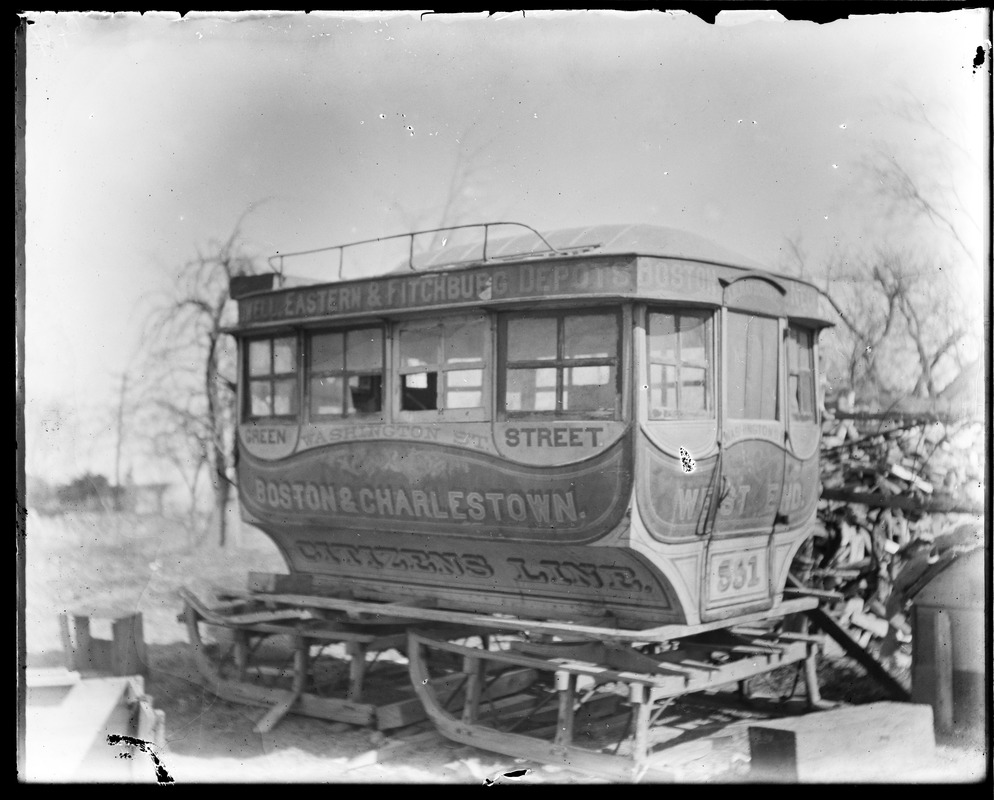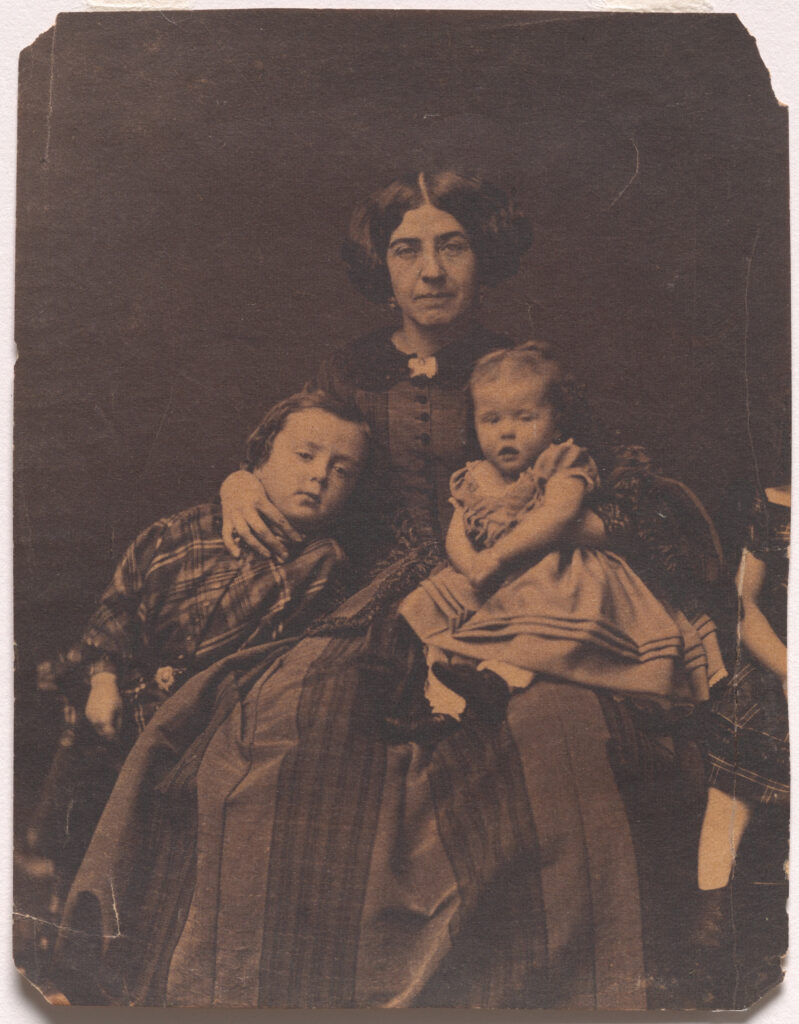Living in an Omnibus: A True Story
By Louisa May Alcott
Annotations by Maggie Kelly/JB

“Chips, ma’am? Only five cents a basket,” said a little voice, as I stood at my gate one morning, deciding which way I should walk. [1]
Looking around, I saw a small yellow-haired, blue-eyed boy, smiling at me with such a cheerful, confiding face, that I took the chips at once, and ordered some more.
“Where do you live?” I asked, as we waited for Katy, the girl, to empty the basket.
“In the old bus, ma’am.”
“The what?” I exclaimed.
“The old omnibus down on the flats, ma’am. It’s cheap, and jolly, now we are used to it,” said the boy.
“How came you to live there?” I asked, laughing at the odd idea.
“We are Germans; and when the father died, we were very poor. We came to this city in the spring; but couldn’t get any place, there were so many of us and we had so little money. We stopped one night in the old bus that was left to tumble to pieces down on the flats behind the great stables. The man who owned it laughed when my mother asked if we might stay there, and said we might for a while; so we’ve been there ever since, and like it lots.”
While the boy spoke, I took a fancy that I’d like to see this queer home of his. The flats were not far off; and I decided to go that way and perhaps help the poor woman, if she seemed honest. As Katy handed back the basket, I said to the lad,
“Will you show me this funny house of yours, and tell me your name?”
“Oh, yes, ma’am; I’m just going home, and my name is Fritz.”
I saw him look wistfully at a tray of nice little cakes which Katy had put to cool on the window-seat, and I gave him one, saying, as he put it in his pocket very carefully,
“How many of you are there?”
“Six besides the mother.”
I just emptied the tray into the basket, and we went away together. We soon came to the flats behind the stables, and there I saw a queer sight. A great, shabby omnibus, of the old-fashioned sort, with a long body, high steps, and flat roof, with the long grass growing about its wheels, and smoke coming out of a stove- pipe poked through the roof. A pig dozed underneath it; ducks waddled and swam in a pool near by; children, of all sizes, swarmed up and down the steps; and a woman was washing in the shadow of the great omnibus.
“That’s mother,” said Fritz, and then left me to introduce myself, while he passed his cake-basket to the little folks.
A stout, cheery, tidy body was Mrs. Hummel, and very ready to tell her story and show her house.
“Hans, the oldest, works in the stables, ma’am, and Gretchen and Fritz sell a many chips; little Karl and Lotte beg the cold victuals, and baby Franz minds the ducks while I wash; and so we get on well, thanks be to Gott,” said the good woman, watching her flock with a contented smile.
She took me into the omnibus, where everything was as neat and closely stowed as on board a ship. The stove stood at the end, and on it was cooking a savory-smelling soup, made from the scraps the children had begged. They slept and sat on the long seats, and eat on a wide board laid across. Clothes were hung to the roof in bundles, or stowed under the seats. The dishes were on a shelf or two over the stove; and the small stock of food they had was kept in a closet made in the driver’s seat, which was boarded over outside, and a door cut from the inside. Some of the boys slept on the roof in fine weather, for they were hardy lads; and a big dog guarded the pig and ducks, as well as the children.
“How will you manage when the cold weather comes?” I asked.
She shook her head, and looked sober for a minute as she stroked the white head of baby Franz, who clung to her gown; then a smile broke over her face, and she answered trustfully:
“I do my best, ma’am, and keep a brave heart in me; for I remember that the dear Gott is a father to such as these; and he won’t let them suffer.”
“You may be sure of that,” I said heartily; and resolved that her beautiful faith should be rewarded by finding friends close by her.
“We are saving to get clothes for Gretchen and Fritz to go to school in the winter, ma’am. Karl and Lotte make toy furniture, as the father taught them; and when the bad weather comes, they can sit warm in the bus, and make their bits of chairs and tables as well as ever. They can earn but little yet; still they are so good I can leave Franz with them, and old Spitz, the dog, while I go out washing when it gets too cold to work here.”

“Perhaps some kind person would take one of the children, and so lessen your care,” I said; for I rather coveted pretty Lotte.
“Ah, but no! I could not spare one even to you, best madam. They are my treasures, and I keep them all, all, as long as I can find bread to give them,” cried the mother, gathering her flock into her arms, and feeling herself rich in spite of poverty. I said no more, but slipped a bit of money into pretty Lotte’s hand, and said good-by.
A happier, healthier, busier set I never saw; each had work to do, and did it cheerfully. Often they had hunger and cold to bear, but bore it patiently. Very seldom did any of the pleasant things that children like come to them; but they were contented, and enjoyed playing with oyster-shells, old shoes, and broken crockery as much as many children enjoy their fine toys. Few mothers have more loving children, or do more for them than good Mrs. Hummel; and I think I never saw a happier family than those little red-cheeked, yellow-haired Germans, as they gratefully smiled and nodded at me from the steps of their funny omnibus home.
Alcott, Louisa May. “Living In an Omnibus: A True Story.” Merry’s Museum and Woodworth’s cabinet 24, no. 1 (July, 1867): 103-05.
Contexts
This piece is a selection from Merry’s Museum and Woodworth’s Cabinet, a continuation of Robert Merry’s Museum, a popular children’s literary magazine in the 19th century. Robert Merry’s Museum was founded in 1841 by Samuel Griswold Goodrich and edited by Alcott from 1867 to 1870. In 1872, the magazine was absorbed by The Youth’s Companion.
Note from Pat Pflieger: “The family—now three children and a mother and renamed ‘Schmidt’—appears in Alcott’s ‘The Autobiography of an Omnibus,’ published in the October 1874 issue of St. Nicholas (pp. 719-723). Told from the bus’s point of view, the story winds through the vehicle’s early years, before it is abandoned and the Schmidts—Hans, Lotte, Lina, and their mother—find a benefactor in the owner of the factory where Hans works; when winter comes, he gives them a house, and the omnibus becomes Lina’s play-house. The Hummel family had, of course, by this time appeared in Little Women (1868).” This story was reprinted in The Youth’s Companion in November 1867 as a “Merry’s Museum” column and in The Hub in May 1879.
Definitions from Oxford English Dictionary:
omnibus: A large public vehicle carrying passengers by road, running on a fixed route and typically requiring the payment of a fare; a bus. Now chiefly historical (esp. with reference to a horse-drawn vehicle of this kind).
Resources for Further Study
- Visit Pat Pflieger’s website on 19th-century children’s literature, which features a page dedicated to Robert Merry’s Museum.
- The Library of Congress has more information about the history of German immigration in the 19th century.
[1] This was Louisa May Alcott’s first piece in Merry’s Museum. It was originally published without an author byline.